Uzbek-Azerbaijani trade, investment take centre stage in landmark diplomatic visit 2025 – year of economic cooperation
Recent efforts by Baku and Tashkent have significantly intensified economic cooperation, aiming to boost trade turnover, logistics, and investment partnerships. The two nations are actively pursuing joint ventures across several key sectors, including petrochemicals, mining, automotive assembly, cotton-textiles, and transportation. This surge in business collaboration is a central focus of Azerbaijani President Ilham Aliyev's two-day state visit to Uzbekistan.
As part of the visit, Azerbaijani Economy Minister Mikayil Jabbarov led a delegation to Tashkent, engaging in the Azerbaijan-Uzbekistan business communities meeting and other high-profile events. The goal is to expand bilateral business cooperation and unlock new economic opportunities, marking a pivotal moment in the growing alliance between the two countries.
The notable surge in interest towards enhancing Azerbaijan-Uzbekistan business cooperation in recent years stems from the pragmatic ambitions of both nations' business communities to fortify trade, transportation, and investment linkages. Crucially, these joint ventures are robustly endorsed by the presidents of Azerbaijan and Uzbekistan—Ilham Aliyev and Shavkat Mirziyoyev—whose concerted efforts have significantly advanced business relations between the two countries.
"Today, the region of Central Asia and the South Caucasus, along with the Caspian Sea, is turning into a single geopolitical region, and positive processes in our regions largely depend on effective cooperation between Uzbekistan and Azerbaijan," Azerbaijani President Ilham Aliyev emphasized as he made a press statement in Tashkent.
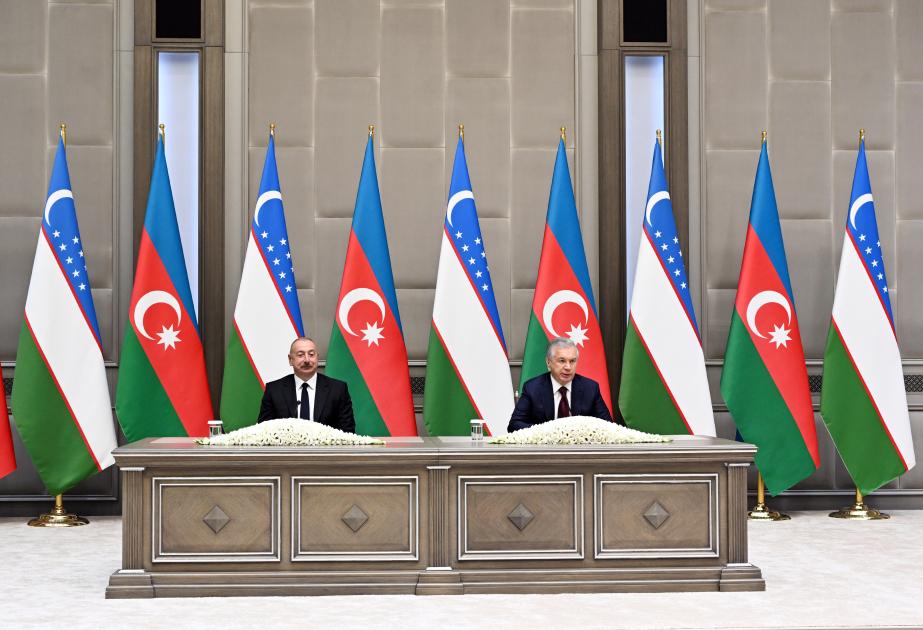
As part of the Azerbaijani President Ilham Aliyev’s state visit to Uzbekistan on August 22-23, high-level discussions and the inaugural meeting of the High Intergovernmental Council, led by the two presidents, underscored efforts to further enhance and expand the strategic partnership between the two countries. The talks concentrated on bolstering mutual trade turnover, curating a new portfolio of cooperative projects, and advancing business relations, including through interregional exchanges. Additionally, the leaders addressed the unlocking of transport and communication potential and engaged with business representatives to explore new opportunities for collaboration.
Shavkat Mirziyoyev characterized the current state visit of Azerbaijani President Ilham Aliyev as a historic milestone, highlighting the rapid elevation of Uzbek-Azerbaijani relations to the pinnacle of interstate interaction within a few short years. He underscored the significance of both the signing of the allied relations treaty and the inaugural meeting of the High Intergovernmental Council, which is poised to serve as a robust mechanism for advancing multifaceted cooperation and infusing it with tangible substance.
The leaders resolved to designate the upcoming year as the "Year of Economic Cooperation" between Uzbekistan and Azerbaijan and to implement a comprehensive program addressing 20 priority areas. They outlined ambitious objectives to enhance trade turnover, transition to a new phase of industrial collaboration, and execute projects in third countries. Both presidents praised the outcomes of the preceding day's business forum, which yielded a portfolio of prospective projects valued at over $2 billion across the identified priority sectors.
“Today, dear Ilham Heydarovich and I signed the Treaty on Allied Relations. This document marks the beginning of a new chapter in the strengthening of our interstate interaction. Thus, we have reaffirmed our unwavering commitment to the course of comprehensive development of multifaceted partnership,” said President Shavkat Mirziyoyev summed up, assuring entrepreneurs that all necessary conditions will be created for their effective and comfortable activity.
Baku and Tashkent are closely involved in integration initiatives of the Organisation of Turkic States (OTS), cooperate in regional transport, transit and logistics projects. Uzbekistan, which has no direct access to the Caspian Sea, is a significant cargo carrier and partner of the countries participating in the Trans-Caspian International Transport Route (TITR) and other routes of the Middle Corridor.
Moreover, agreements have been reached to provide Uzbek companies with a site to establish their own terminal at the Baku International Sea Trade Port (BISTP), which will be used for transit transportations of sugar to Uzbekistan, as well as for other export-import operations with Azerbaijan. In turn, ADY Container, an Azerbaijani subsidiary of Azerbaijan Railways, and vessels of the Caspian Shipping Company (ASCO) deliver block trains of mineral fertilisers produced in Uzbekistan to the Romanian port of Constanta.
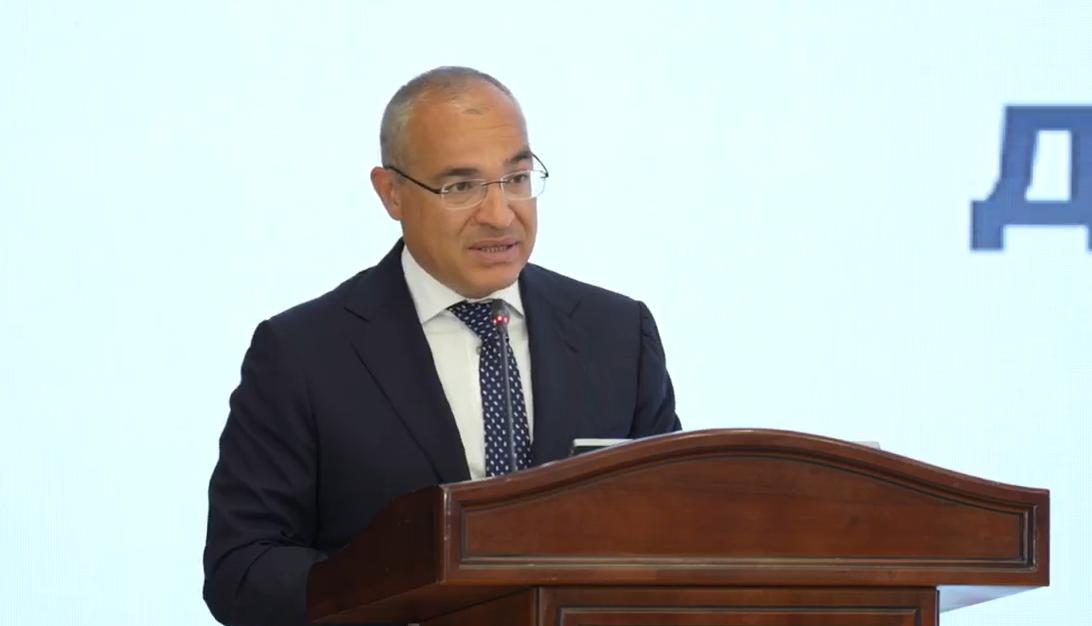
In his remarks, Azerbaijan’s Minister of Economy Mikail Jabbarov highlighted the positive outcomes of well-established transport and logistics networks, noting a steady 25-30 per cent increase in freight traffic in both directions. He also pointed out that a recent joint visit by representatives from Azerbaijani and Uzbek ministries and companies to Afghanistan underscores the broader scope of potential collaborative ventures.
"There are significant opportunities for entrepreneurs to expand their joint activities not only within Azerbaijan and Uzbekistan but also in third countries. The Afghan market appears particularly promising for our joint endeavors, though it is not the only region where our nations can effectively collaborate and realize their ambitions," Jabbarov emphasized.
The impressive surge in transport and logistics cooperation is mirrored in the trade figures between Azerbaijan and Uzbekistan. In 2017, trade turnover between the two nations was a modest $31.2 million, but over six years, this has grown more than sevenfold. By the end of 2023, mutual trade had reached $231.6 million, reflecting a 26.5 per cent increase year-on-year.
The positive trend has continued into the current year, with Azerbaijan-Uzbekistan trade reaching $118.2 million from January to July 2024, marking a 20 per cent growth. Both Baku and Tashkent aim to elevate trade volumes to $1 billion in the coming years—an attainable goal, supported by robust state backing and a comprehensive bilateral legal framework that includes approximately 180 interstate, intergovernmental, and interdepartmental agreements.
The Azerbaijani-Uzbek business forum held in Tashkent explored strategic directions for expanding business cooperation. The forum was attended by 67 Azerbaijani companies and around 10 state organizations, featuring a Made in Azerbaijan exhibition under the theme “Main Directions of Economy - A Step Towards Joint Prosperity".
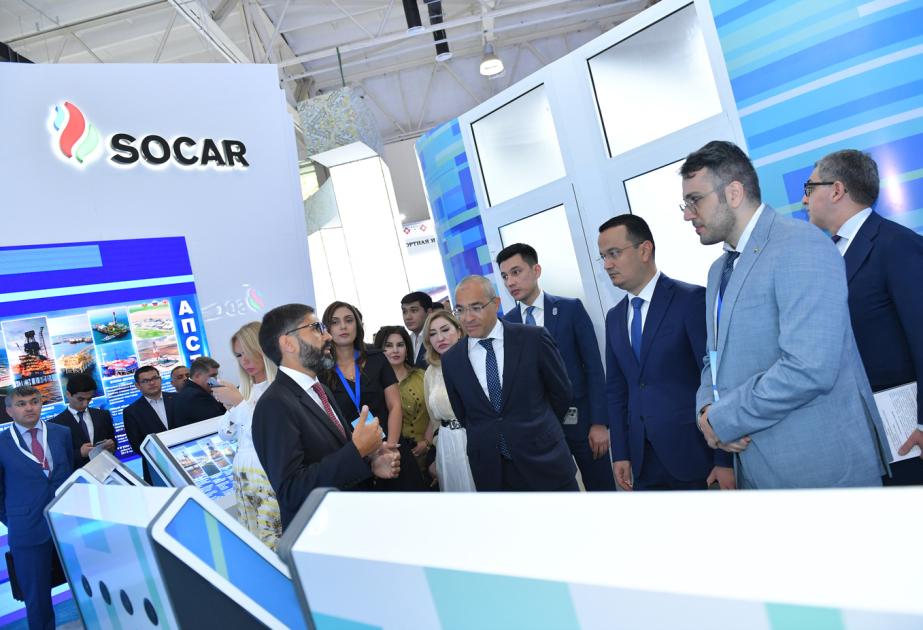
"Today, we are actively collaborating across various sectors, including energy, urban development, machinery, textiles, silk, and agriculture," said Laziz Kudratov, Uzbek Minister of Investment, Industry, and Trade.
"We are advancing a project for producing ‘green’ energy, which will be exported through Azerbaijan to European markets (Black Sea Energy). Additionally, we are initiating geological exploration with State Oil Company (SOCAR) on the Ustyurt plateau in Uzbekistan. I am confident that this marks the beginning of our extensive strategic cooperation in the energy sector."
Kudratov noted that major Azerbaijani companies have already commenced operations in Uzbekistan. The expansion of active dialogue and the creation of conditions for more frequent interactions between entrepreneurs from both countries are expected to lead to tangible trade contracts and industrial projects.
Specific plans include opening trade houses and showrooms in Baku, Shusha, Tashkent, and Samarkand. Furthermore, Uzbek companies are exploring opportunities to process minerals in Azerbaijan, particularly for producing construction materials needed for reconstruction in the Karabakh region.
In turn, Azerbaijani firms are invited to participate in developing copper deposits and extracting other non-ferrous metals in Uzbekistan.
Azerbaijan and Uzbekistan are strengthening their collaboration in agriculture, focusing on cotton cultivation, silk production, and the development of raw material processing and textiles.
"One significant project is the creation of a new light industry enterprise in the liberated city of Khankandi. This is yet another symbol of the brotherhood and friendship between our nations," stated President Ilham Aliyev, highlighting the active role of Uzbek partners in the restoration of Azerbaijan's liberated territories.
Textile production is set to commence in Khankandi, with an Uzbek company leading the investment. Additionally, in July 2024, Azerbaijan's TST Textile Group LLC and Uzbekistan's Tukımachı Sanoat Tekstıl LLC signed an agreement for cotton cultivation and oil production at the Imishli agro-park.
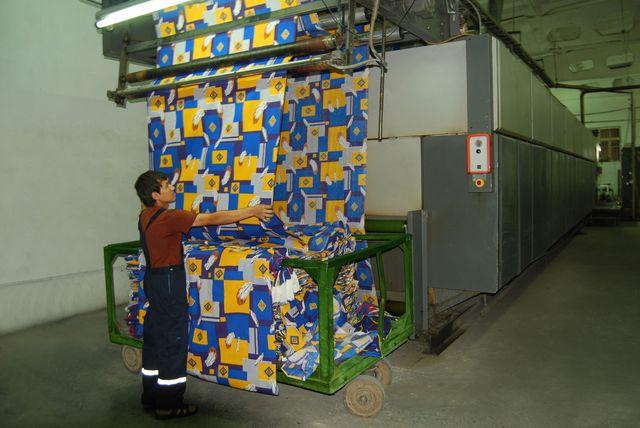
From 2025 to 2029, the Uzbek investor will contribute AZN 92.5 million to build facilities for yarn, textile, and garment production at the Mingachevir industrial park.
In recent years, Azerbaijani-Uzbek investment cooperation has accelerated significantly. One notable example is the Azerbaijani-Uzbek joint venture for assembling Chevrolet cars, which has been operational in the Hajigabul industrial District for three years.
As of July 1, the plant has produced 5,300 passenger cars. Plans are underway to expand this collaboration further, with new joint ventures in construction materials, household appliances, and aluminum radiators being established in the Alat Free Economic Zone (AFEZ).
The joint Roadmap for expanding trade, economic, and investment cooperation for 2024-2025 outlines projects across various sectors, including agriculture, tourism, construction, and pharmaceuticals.
Currently, 236 Azerbaijani-owned enterprises, including 62 joint ventures, are active in Uzbekistan, while 70 Uzbek companies are engaged in Azerbaijan’s economy. This dynamic growth is expected to continue, bolstered by favorable financing conditions.
In December 2023, Uzbekistan and Azerbaijan signed a bilateral agreement to establish the An Azerbaijani-Uzbek investment company (AUİC) with an authorized capital of $500 million. The official opening of this joint investment company’s office in Tashkent also took place on the sidelines of the visit.
“Azerbaijan and Uzbekistan need to increase the capital of their joint investment fund. We will increase it for our bilateral agenda and for investing in third countries," Azerbaijani President Ilham Aliyev said during a press statement following the talks.
He highlighted that the primary aim of the Azerbaijani-Uzbek Investment Company is to finance joint projects by acquiring up to 49 per cent of their capital.
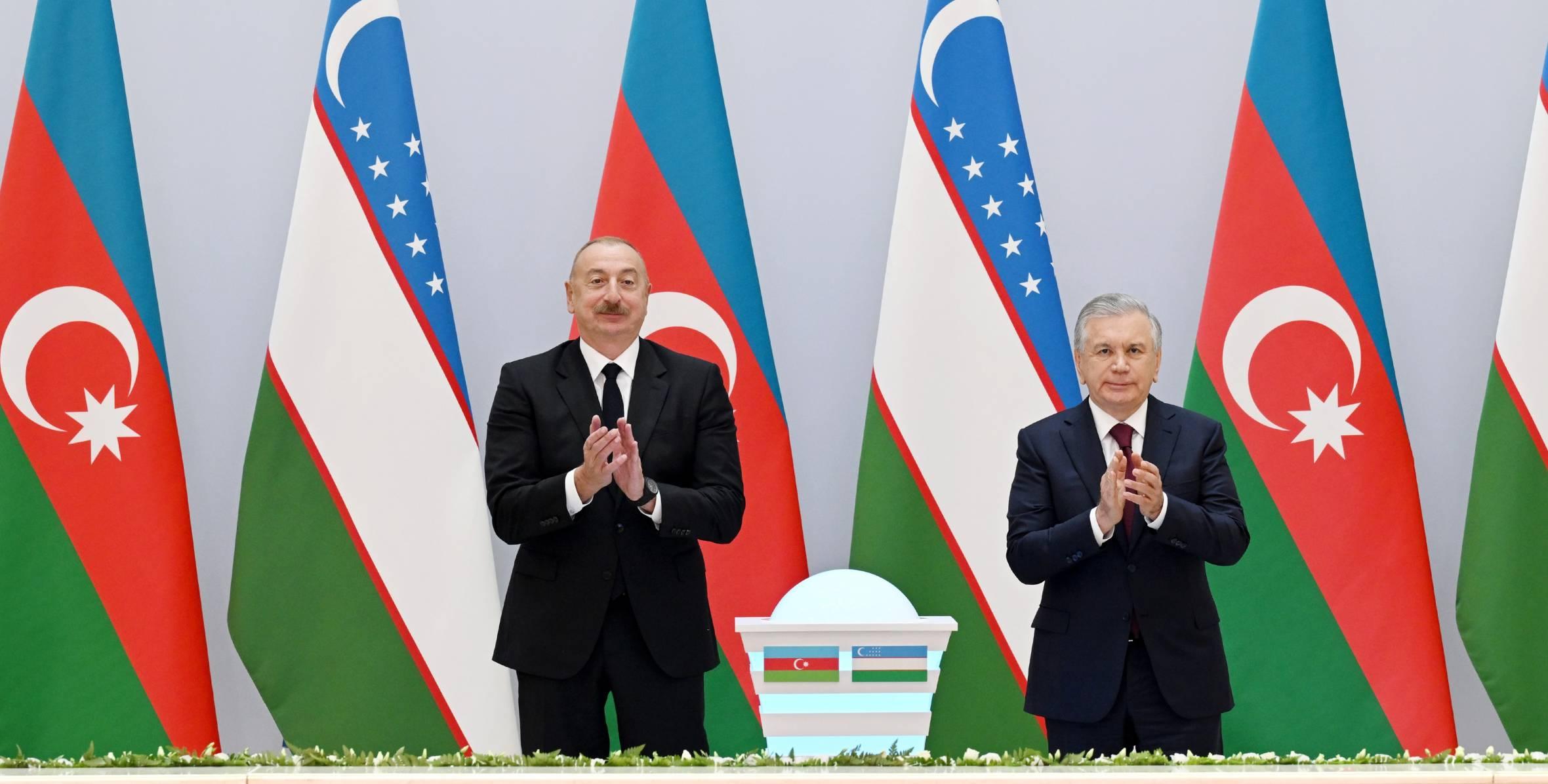
During the extensive meetings and negotiations in Tashkent, attended by the leaders of two nations, a significant number of bilateral agreements were signed. These include the “Practical Action Plan for 2024-2025 (Roadmap) for the Expansion of Trade-Economic and Investment Cooperation”, the “Action Plan for 2024-2026 in the Field of Tourism”, a “Key Terms Agreement" between the State Oil Company of the Republic of Azerbaijan (SOCAR) and Uzbekneftegaz JSC, and an intergovernmental agreement on labor and the protection of the rights of citizens temporarily working in each other's countries.








